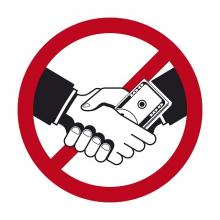INTERNATIONAL MECHANISMS COMBATING CORRUPTION IN MODERN TIMES
Corruption or bribery is understood as an undesirable phenomenon that has a negative impact on all areas of society. This undesirable phenomenon has very unpleasant consequences in society, leads to loss of dignity and respect, human rights and freedoms, progress of society.
It should be noted that corruption and other actions of corruptive nature create obstacles for the development of the economy and welfare of people, the exercise of human and civil rights and freedoms, stability and peace of every country, represent the greatest danger - the distrust of people in the public authorities.
At the same time, in modern conditions corruption is one of the main obstacles to the realization of human rights and freedoms. Therefore, the effectiveness of the fight against corruption is closely dependent on the active participation of all branches of government and civil society in its implementation. From this point of view, citizens should work in good faith and serve the people and the state with dignity in this direction.
In today's world, corruption is one of the most complex problems and has become universal. It is one of the new global threats. It threatens the political and state security of countries, disrupts the socio-economic and cultural development of society. In the current environment, it is almost impossible to find countries free of corruption.
This problem has, in fact, engulfed various countries around the world. For many years, statesmen and officials, whose loyalty and fairness are at the center of their activities, have been constantly trying to fight this phenomenon. Many different international organizations and associations have been created, the main purpose of which is to reduce or eliminate corrupt operations in the global community. Representatives of these institutions in different countries regularly take measures and actively fight corruption together with the state and authorized bodies.
The issue of fighting and combating corruption has always been recognized by international organizations, especially the UN, as one of the first tasks.
For this purpose, in order to prevent any kind of crime and fight corruption, the UN Convention Against Corruption was adopted on October 31, 2003, and on December 9, 2003, in Merida, Mexico, a high-level political conference was held with the participation of representatives from over 100 countries that joined other countries of the world. Thus, December 9 was adopted as "International Anti-Corruption Day.
Tajikistan signed this Convention on 25 September 2006, and it was approved by the Majlisi namavand Majlisi Oli of Tajikistan on 16 April 2008. Also, in order to unite anti-corruption efforts of the State and direct fight against corruption, to involve civil society, representatives of the private sector and international organizations in the process of combating corruption based on the mentioned Convention the Agency for State Financial Control and Fight against Corruption of the Republic of Tajikistan was established by the Presidential Decree of January 10, 2007 by the authorized state body.
The main tasks of the Agency are, first of all, state financial control, prevention, elimination and detection of corruption offenses, pre-trial investigation, investigation of corruption crimes and implementation of a set of measures of the state anti-corruption policy.
The international community considers the adoption of specific legal and legal measures to more effectively combat corruption as one of the most effective ways to combat bribery.
In this context, the Republic of Tajikistan has adopted a number of normative legal acts to combat and counteract corruption. The issue of combating and counteracting these undesirable phenomena was regulated by the Law of the Republic of Tajikistan "On Combating Corruption" dated July 25, 2005 №100. Subsequently, with the establishment of the State Agency for Financial Control and Combating Corruption of the Republic of Tajikistan and the adoption of the Law of the Republic of Tajikistan "On the State Agency for Financial Control and Combating Corruption of the Republic of Tajikistan" dated March 20, 2008, №374 and the Law of the Republic of Tajikistan "On Combating Corruption" dated August 7, 2020, №1714 anti-corruption fight was revived and its organizational and legal framework was strengthened.
At the same time, the adoption of other strategic planning documents, such as the "Anti-Corruption Strategy in the Republic of Tajikistan for 2008-2012" dated January 26, 2008 № 34; "Anti-Corruption Strategy in the Republic of Tajikistan for 2013-2020" dated August 30, 2013 №1504 and "State Strategy to Combat Corruption in the Republic of Tajikistan for the period until 2030" dated August 3, 2021 №222 Reducing the growth of corruption in the country has laid a real and legal basis.
It should be emphasized that the fight against corruption is not only the responsibility of anti-corruption bodies, but also a collective struggle. Therefore, the fight against this undesirable phenomenon of modernity is necessary for every citizen of the republic in cooperation with the relevant authorities.
Thus, in order to prevent acts of corruption, to create an uncompromising atmosphere for it and to involve in this process all state bodies, mass media and civil society institutions the subjects of the fight against corruption must be implemented.
mmk.tj
translated
Ruzimuhammad Ismoilov

